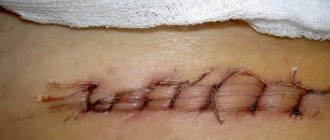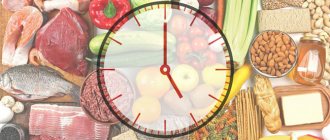Digestion in the mouth
The first stage of digestion begins in the oral cavity, where food is crushed/chewed and processed by a secretion called saliva.
(Up to 1.5 liters of saliva are produced daily.) In fact, the digestion process begins even before food touches our lips, since the very thought of food already fills our mouth with saliva. Saliva is a secretion secreted by three paired salivary glands. It is 99% water and contains enzymes, the most important of which is alpha-amylase, which is involved in the hydrolysis/breakdown of carbohydrates. That is, of all food components (proteins, fats and carbohydrates), only carbohydrates begin to hydrolyze in the oral cavity! Salivary enzymes do not act on either fats or proteins. The process of carbohydrate breakdown requires an alkaline environment!
The composition of saliva also includes: lysozyme, which has bactericidal properties and serves as a local protective factor for the oral mucosa; and mucin, a mucus-like substance that forms a smooth, chewable bolus of food that is easy to swallow and transport through the esophagus into the stomach.
Why is it important to chew your food well? Firstly, in order to grind it well and moisten it with saliva, and start the digestion process. Secondly, in Eastern medicine, teeth are associated with energy channels (meridians) passing through them. Chewing activates the movement of energy through the channels. The destruction of certain teeth indicates problems in the corresponding organs and systems of the body.
We don't think about the saliva in our mouth and don't notice its absence. We often walk around for a long time with a feeling of dry mouth. And saliva contains many chemicals necessary for good digestion and the preservation of the oral mucosa. Its release depends on pleasant, familiar smells and tastes. Saliva provides the taste of food. Molecules broken down in saliva reach 10,000 taste buds on the tongue, which can detect and highlight sweet, sour, bitter, spicy and salty tastes even in new foods. This allows you to perceive food as a pleasure, an enjoyment of tastes. Without moisture we cannot taste. If the tongue is dry, then we don’t feel like we’re eating. Without saliva we cannot swallow.
Therefore, it is so important for healthy digestion to eat food in a calm environment, not “on the run,” in beautiful dishes, tasty prepared. It is important, without rushing and without being distracted by reading, talking or watching TV, to chew your food slowly, enjoying the variety of taste sensations. It is important to eat at the same time, as this promotes secretory regulation. It is important to drink enough plain water at least 30 minutes before meals and an hour after meals. Water is necessary for the formation of saliva and other digestive juices, and the activation of enzymes.
It is difficult to maintain an alkaline balance in the oral cavity if a person constantly eats something, especially sweets, which always leads to acidification of the environment. After eating, it is recommended to rinse your mouth and/or chew something that tastes bitter, such as cardamom seeds or parsley.
And I also want to add about hygiene, cleaning teeth and gums. It was, and still is, a tradition among many peoples to brush their teeth with twigs and roots, which often have a bitter, astringent taste. And tooth powders also taste bitter. Bitter and astringent tastes are cleansing, have a bactericidal effect, and increase the secretion of saliva. While the sweet taste, on the contrary, promotes the growth of bacteria and stagnation. But manufacturers of modern toothpastes (especially sweet children's ones) simply add antimicrobial agents and preservatives, and we turn a blind eye to this. In our area, the pine taste is bitter, tart/astringent. If children are not accustomed to sweet tastes, they will normally accept unsweetened toothpaste.
Let's get back to digestion. As soon as food enters the mouth, preparation for digestion begins in the stomach: hydrochloric acid is released and gastric juice enzymes are activated.
Food entering the human body cannot be assimilated and used for plastic purposes and the formation of vital energy, since its physical state and chemical composition are very complex. To transform food into a state easily digestible by the body, humans have special organs that carry out digestion.
Rice. 2.1. Diagram of the digestive apparatus: 1 - oral cavity; 2 - salivary glands; 3-throat; 4-esophagus; 5-stomach; 6 – duodenum; 7 - liver; 8 - gallbladder; 9 - bile duct; 10 - pancreas; 11 - small intestines; 12 - large intestines; 13 - rectum.
Digestion is a set of processes that ensure the physical change and chemical breakdown of nutrients into simple compounds that can be easily absorbed into the blood and participate in the vital functions of the human body.
The human digestive apparatus consists of the following organs: oral cavity (oral opening, tongue, teeth, masticatory muscles, salivary glands, glands of the oral mucosa), pharynx, esophagus, stomach, duodenum, pancreas, liver, small intestines, large intestines , rectum (Fig. 2.1). All digestive organs consist of three membranes: the inner membrane, which contains glands that secrete mucus, and in a number of organs, digestive juices; the middle one is muscular, which ensures the movement of food by contraction, and the outer one is serous, which acts as a covering layer.
During the day, a person secretes about 7 liters of digestive juices, which include: water, which dilutes food gruel, mucus, which promotes better movement of food, salts and enzymes - catalysts of biochemical processes that break down food substances into simple compounds. Depending on the effect on certain substances, enzymes are divided into proteases, which break down proteins (proteins), amylases, which break down carbohydrates, and lipases, which break down fats (lipids).
Each enzyme is active only in a certain environment (acidic, alkaline, or neutral). As a result of breakdown, amino acids are obtained from proteins, glycerol and fatty acids from fats, and mainly glucose from carbohydrates. Water, mineral salts, and vitamins contained in food do not undergo changes during the digestion process.
The process of digestion and absorption of nutrients occurs in three stages: cavity digestion (in the gastrointestinal tract), parietal (membrane) and intracellular.
The mechanism of cavity digestion was studied by I.P. Pavlov and his students - I.P. Razenkov and others. They found that different foods correspond to different functions of the digestive glands, i.e. For a certain composition of products, digestive juices with enzymes of corresponding activity are released. In addition, I.P. Pavlov and his students established that the digestion process has two phases:
- psychogenic, when digestive juice is released at the sight of food, the smell of it, or the memory of it;
- humoral, or chemical, when digestive juices are secreted in response to the contact of food with the mucous membrane.
The well-known scientist A. M. Ugolev studied the mechanism of parietal digestion. Thus, it has been established that the activity of enzymes, and therefore the process of assimilation of nutrients, depends on the combination in the food taken. The combination of protein, carbohydrate and fatty foods is absorbed faster than carbohydrate-fatty foods. Regulation of the process of nutrient absorption is due to the presence of subunits in enzymes, which change throughout a person’s life, as well as under conditions of stress, excitement, etc. It is necessary that the composition of dishes correspond to the composition and activity of digestive enzymes produced by the body.
The mechanism of action of lysosomes on the absorption of nutrients inside cells was studied by A. A. Pokrovsky [3].
Myths and truth about your stomach
Pirogova Irina Yurievna
Gastroenterologist-nutritionist, doctor of integrative medicine
When it comes to the human stomach and digestive system, there are many myths and assumptions. Do you know the truth?
Our stomach can cause a lot of discomfort if it is not working properly. Discomfort is often associated with heartburn, belching or bloating.
Experts say that most people know very little about their stomach and how the digestive tract works, which is one of the reasons why it can sometimes be quite difficult to solve health problems that arise.
Fact or Fiction: The digestive process occurs exclusively in the stomach
It is a myth.
The main process of digestion actually occurs in the small intestine.
The food enters the stomach, is mixed and crushed into tiny pieces, becoming food mush
. This pulp enters the small intestine in small batches, where it is digested.
Refuting popular opinion, experts say that food does not begin to be digested immediately after it enters our stomach. In fact, the stomach only prepares food for digestion.
Fact or Fiction: If you reduce the amount of food you eat, your stomach will shrink and you will be less hungry
It is a myth.
When a person becomes an adult, the size of his stomach no longer changes, unless, of course, he undergoes surgery to reduce it.
Eating less may not allow your stomach to shrink, but it may help reset your “appetite regulator.” Therefore, you will not feel very hungry even if you start eating less.
Fact or Fiction: Thin people have smaller stomachs than obese people
It is a myth.
Although it may be hard to believe, the size of the stomach does not correspond to a person's overall weight.
People who are naturally thin may have exactly the same stomach size as those who have struggled with excess weight their whole lives. Even if you have stomach surgery and reduce it to the size of a walnut, this does not mean that you are not you will gain weight.
Fact or Fiction: Squats or ab crunches can reduce the size of your stomach
It is a myth.
No amount of exercise can help make your stomach smaller, but it can help you get rid of layers of belly fat. Plus, exercise helps strengthen the muscles in your abdomen, which is good for your internal organs.
Interestingly, belly fat can cause a lot of problems, including fat that we don't actually see. This fat accumulates in the form of internal layers and surrounds the internal organs. Overweight people have a lot of fat between the internal organs. In this case, sometimes the liver becomes so “packed in fat” that it leads to a certain form of hepatitis; in special cases, it fails altogether, experts say. The good news is that eating right not only helps control the appearance of visible fat, but also prevents the inner layers of fatty tissue from appearing.
Fact or Fiction: Foods high in water-soluble fiber cause bloating and gas in the intestines, while foods high in insoluble fiber usually do not cause these problems.
This is true.
Fiber is dietary fiber found in most plants. It is the basis of cell walls in plant organisms. Fiber plays an important role in the functioning of the body, promoting good digestion. Many people don't know that there are different types of fiber. Water-soluble fiber is found in foods such as oatmeal, legumes, peas and citrus fruits - these foods are more likely to cause bloating and gas than foods with insoluble fiber - whole wheat bread, wheat, cabbage, beets and carrots.
Gas and bloating occur because the intestinal flora needs to digest soluble fiber. Since insoluble fiber is not digested at all, but simply passes through the gastrointestinal tract, it does not interact with the flora, so gases do not form.
Fact or Fiction: To get rid of reflux disease (sour belching), just lose a little weight
This is true.
The less acid enters the esophagus, the fewer problems. You may not believe it, but it’s enough to remove an extra kilogram from the stomach, and the result will be immediately felt.
During pregnancy, the baby grows and puts pressure on the internal organs, this can cause heartburn, but after childbirth, when the pressure goes away, the heartburn goes away.
The good news, experts say, is that if you lose weight first, you'll be free of heartburn within a few weeks.
Fact or Fiction: If you eat at night, you will gain weight faster than if you eat the same thing during the day
It is a myth.
Most experts believe that we gain weight because we consume more calories than we expend. And although it seems quite logical that the food we eat during an active day burns faster and is more effective than the food we eat before bed, weight gain is not at all dependent on the time of day. Whether you gain excess weight or not depends on how efficiently you spend your calories.
Recent animal studies have shown that avoiding eating in the evening may not help you lose weight. Eating at night can disrupt our body's circadian rhythms, altering the hormones that control appetite, causing us to gain weight.
Also, if you are tired or stressed, digestion is difficult before bed and you may experience bloating, gas, or heartburn. Our digestive canal has its own “brain” that helps food move through the digestive system correctly and in the right quantity. If we are tired, and this happens to almost everyone after a whole day of work, the “brain” of our intestines also gets tired, so it reduces the number of contractions, this, in turn, does not allow food to be properly digested.
Fact or fiction: Cookies with 200 kcal butter will control your appetite more than 200 kcal cookies without butter
This is true
. The reason is that fats are digested much more slowly than carbohydrates and stay in the stomach longer, which means we'll feel full longer if we eat a buttery cookie.
Moreover, simple carbohydrates (cookies, bread or pastries) are known to quickly increase blood sugar and insulin levels, which quickly decrease, leading to mood and appetite swings. You'll get hungry quickly.
Fact or Fiction: Legumes cause gas in everyone, and there's nothing you can do about it
It's a myth...sort of.
Legumes contain a lot of sugar, which requires a certain enzyme to be digested. Some people have a lot of this enzyme, others have a little. The less enzyme you have, the more gases will form in the intestines after eating legumes.
We have given only some of the questions that are often encountered by gastroenterologist patients.
We will be happy to answer your other questions in personal communication - Pirogova Irina Yurievna
How long does it take for food to be absorbed in the body?
Food plays a major role in our lives - without it we cannot exist. In addition, our psychological comfort also depends on nutrition. Studies have shown that people who eat a varied diet lose weight much faster than other subjects with the same nutritional content on a boring diet. In addition, it greatly improves your mood. So food is both a physical and psychological factor. But few people think, while chewing a salad, about how long it takes for food to be absorbed in the body .
How it works?
To answer this question, we must, in principle, understand the mechanism of human nutrition. The digestion process begins not in the stomach, but in the oral cavity, where food is ground and ground with teeth, moistened with saliva and enters into chemical reactions with it. In addition, the process of glucose absorption begins in the oral cavity. After this, the food bolus moves through wave-like contractions of the walls along the esophagus into the stomach. This is where the first stage of magic begins - the breakdown of proteins and fats using gastric juice. Food can spend in the stomach from half an hour to 4 hours - it depends on its composition. Fruits and vegetables take the fastest to digest, while fatty meats and mixed heavy meals take the longest to digest. This is why doctors recommend eating fruits and vegetables before meals - so that they do not linger in the stomach for a long time due to heavy components and do not begin to ferment there. If this happens, then the person is likely to experience bloating, belching and other problems with indigestion. Next, the food moves into the intestines. Here, with the help of a dense network of capillaries, the body receives broken down proteins and fats from the digested gruel, and intensive breakdown and absorption of carbohydrates also occurs. At the same time, dietary fiber remains intact and helps remove undigested food particles, preventing them from rotting. Otherwise, a slight general intoxication of the body occurs - acne, lethargy, and fatigue appear. Sometimes people don’t even realize that an intestinal problem is to blame. Food travels this entire path, which ends in front of the large intestine, in 7-8 hours. After this, the food (or rather, what is left of it) accumulates in the large intestine and can wait there for up to 20 hours to be released. So, the answer to the question: how long does it take for food to be absorbed in the body - up to 32 hours. What does this knowledge give us?
Forewarned is forearmed
Knowing the maximum digestion time for various foods, you can optimize your diet and protect yourself from unpleasant health problems. For example, juices or vegetable and fruit decoctions will leave the stomach after 20 minutes, and pasta made from white flour will take almost 3 hours. It turns out that a portion of pasta, washed down with compote or tomato juice, will be there for its legal three hours, during which the juice will simply begin to ferment, since the body temperature is ideal for various bacteria. In general, it is better to eat fatty meat in the first half of the day or at lunch, so that later during sleep the body does not digest food instead of resting. This useful knowledge about how long it takes for food to be absorbed in the body, and actions based on it, will allow you to get rid of excess toxins, for which the skin on your face will thank you by acquiring a healthy color. In addition, activity and vital energy levels will increase. In addition, you will be able to forget about increased gas formation and irregular bowel movements. So it's time to review your diet and menu and take another step towards health and beauty.









